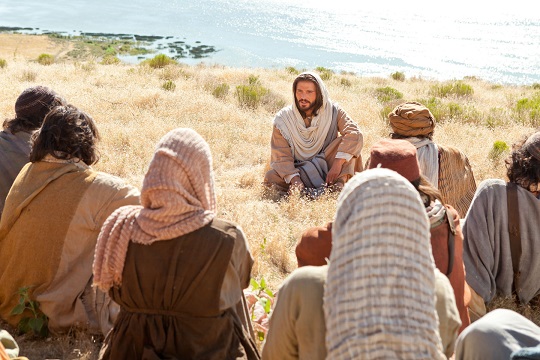The
Sermon on the Mount
Stephen
Terry
Commentary
for the April 16, 2016 Sabbath School Lesson
 “Now
when Jesus saw the crowds, he went up on a mountainside and sat down. His
disciples came to him, and he began to teach them.” Matthew 5:1-2a, NIV
“Now
when Jesus saw the crowds, he went up on a mountainside and sat down. His
disciples came to him, and he began to teach them.” Matthew 5:1-2a, NIV
It seems every great movement in history has a
foundational document that highlights the principles behind the movement,
principles that differentiate those within the movement from those without. In
1776, The Declaration of Independence became such a document for the United
States of America, setting aside the idea of monarchy and providing the basis
for personal liberties that would come to be echoed in the Constitution,
thirteen years later. In 1848, Karl Marx and Friedrich Engels wrote “The
Communist Manifesto” which ultimately became the foundational document for the
world Communist movement. Ostensibly proposing a classless society where all
own the means of production and all reap the rewards equally, Communism has
struggled to achieve the pure goals it advocated. Instead, like all societies,
it has been beset with corruption and greed as those entrusted with power
wielded it with too little regard for morality.
Perhaps in part a response to the failures of Communism,
Adolf Hitler wrote a biography, “Mein Kampf,” in 1925 that became a
foundational document for National Socialism, commonly referred to as Nazism.
He asserted nationalism as the answer to forces, primarily imposed on the
nation by outsiders, which were destroying the economy and the ability of the
people to survive. In reality those supposed oppressors (Communists, Jews,
etc.) only came to be replaced by the internal oppression of nationalism gone
mad. Nazism seemed to usher in an age where nationalism tended to become the
answer for every form of government and often became synonymous with survival
for nations under threat. Like Hitler, those nations often tended to confuse
that nationalism with a cult of personality. We see this in Stalinism where
Stalin’s will became identical to the national will. Even in the United States,
Senator Joseph McCarthy attempted to parlay nationalism into a personality cult
catering to his will at the expense of those he disfavored.
Perhaps the cult of personality reached its pinnacle in
“The Quotations of Chairman Mao Tse-tung” also known as “The Little Red Book,”
published in 1964. The book was a collection of pithy sayings intended to
provide guidance in how to advance world Communism. However, repeated warfare
with China’s neighbors Russia and Vietnam illustrated that the Communism
advanced was primarily Chinese Communism. The cult of personality did not
succeed in divorcing Nationalism from Communism. Che Guevara’s “The Motorcycle
Diaries,” written in 1952 while he traveled South America by motorcycle, but not
published until 1993, presciently thought that international boundaries
(nationalism) effectively prevented a widespread answer to poverty and
oppression. His answer was to foment rebellion across borders to restore the
equality he saw lacking in modern society. Ultimately, even the New World
Communism he championed devolved into a cult of personality around the strong
man, Fidel Castro. Disillusioned, he went his own way and ultimately died at
the hands of the very powers he sought to remove. Romanticized today like a
modern-day Robin Hood. His efforts failed to achieve any significant change in
the social order. Russia, China and even Cuba began reaching out to embrace
some aspects of Capitalism, apparently believing that a hybrid form of social
experiment may have a greater chance at success. Interestingly, while these
various governments have moved toward Capitalism, bastions of Capitalism like
The United States and The European Union have moved toward embracing elements
of Socialism to moderate some of their more extreme failings, such as
inadequate healthcare and unequal access to educational opportunities.
Perhaps, if present trends are allowed to continue, we
may indeed find ourselves governed globally by some hybrid form of government
that ideally would incorporate the best elements of each. If so, it may not
come easily or without tremendous loss of life, as vested interests may not
willingly abdicate in favor of the greater interest of all. Perhaps the
millions who died under Stalin and as a result of Mao’s Cultural Revolution are
macabre harbingers of that future. Even now hundreds of thousands are dying
around the globe as various visions of what the future should be vie for
supremacy.
These visions are not limited to political movements.
Religion has its own visions of what society should be like. These visions at
times come into direct conflict with the political forces trying to implement
more secular alternatives. Currently we see several areas where this is playing
out. Perhaps the most violent is the clash between Sunni and Shia Muslims.
While this clash is primarily taking place in the Middle East and Africa, its
tentacles reach globally as otherwise passive Muslim communities are swept up
into the violence as radicalized family members plunge into the fray. In some
ways the terror created my parallel the Viking incursions into Europe during
the three centuries beginning in the late 8th century. Ultimately,
through intermarriage and assimilation, Viking and European values merged.
Perhaps this will be the outcome of the present Muslim conflicts as well. The
Quran is foundational to both Shia and Sunni Muslims and, if the desire is
there, may be able to provide the foundation for rapprochement.
Christianity, also, has its foundational document, the
Bible. They share the Old Testament scriptures with Judaism, but distinctively,
the New Testament sets them apart from that earlier faith. Arguably the most
foundational principles of the entire document may be the three chapters in the
Book of Matthew known as “The Sermon on the Mount.” That sermon sets forth the
principles of citizenship in what is referred to as the Kingdom of God. These
principles are held to echo the character of God which, because of His grace
and mercy, is worthy of emulation.[i] Instructive for
identifying that character but not limited to it, The Beatitudes[ii] provide a description of
some of the attributes of the kingdom’s citizens. These attributes consist of humility,
sadness over what is going on here on Earth, character that does not promote
itself, desire for righteousness, willingness to show mercy to others,
willingness to seek purity, desire to work for peace, and willingness to endure
persecution in order to maintain those principles. In line with these
principles, Jesus proposes that while the Law remains binding, it is the
character of the one keeping it that is of greater importance than the mere
letter of the law. This he illustrates by showing how keeping the letter of the
law falls short in the case of murder and adultery, as well as how those in the
Kingdom of God should deal with evil in general.
Jesus goes on to point out the need to sacrifice
ourselves for the sake of those in need, but to do it in such a way as to avoid
bringing honor and recognition to ourselves. This could promote the opposite of
humility and perhaps tempt us to develop pride in our own righteousness. While
helping the needy is an antidote to greed, Jesus points out that greed may be
based on a fear that we will not have enough for our needs. He urges us to
understand that God will provide for all of our needs. Therefore the fear that
feeds greed is unnecessary.
If we desire to attain to citizenship in that kingdom,
we must also be aware of the temptation we can face to judge others. Comparing
ourselves to the standards of the kingdom is fine, as long as we do not use
that knowledge to compare ourselves to others and judge them for their failings
compared to our supposed successes. In reality, though, that judging is a
greater fault than any supposed error that may have developed in the other
person’s life, so much so that it is like a beam compared to a speck.[iii] However, paradoxically
Jesus follows this instruction with a command to watch out for false prophets.
He tells us that their fruits will identify them. Perhaps this is because their
fruits will be the opposite of those of the Holy Spirit.[iv] Instead of love, there is
hatred. Instead of joy, there is sadness. Instead of peace, there is strife.
Instead of forbearance, there is impatience. Instead of kindness, there is
meanness. Instead of goodness, there is evil. Instead of faithfulness, there is
unreliability. Instead of gentleness, there is harshness. Instead of
self-control, there is slavery to passion and desire. While there is no law
against the fruits of the Spirit, the fruits of the false prophets lead to
lawlessness and evil.
So how do we reconcile dealing with false prophets and
not judging? We are admonished that we will be judged by the same standard that
we judge others. Perhaps in order to deal with false prophets, we must be
careful to not be guilty of their failings. The contrast between the Spirit’s
fruits and the false prophet’s fruits may then be a safeguard to avoid crossing
the line into inappropriate judging. Maybe this is the secret to building a
strong edifice, a kingdom that can withstand the winds of strife and trouble
that will seek to overthrow it. For two thousand years these principles have
been known to us. But we have struggled with the same problems that every other
movement. It is hard to give up the desire to possess more than we need. But if
we cannot overcome this selfishness, no movement, and no system of governance
will be able to save us from ourselves. We are powerless to do this even for
the Kingdom of God. We must trust completely in God to accomplish what we
cannot.[v] Thousands of years of
history have revealed there is no other way.
